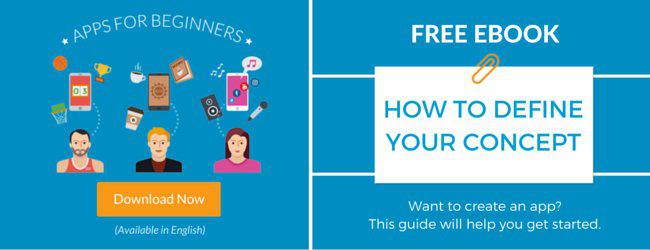Creating apps and getting user feedback: do you know when and how?
Written by GoodBarber Team on

Inspiring success stories are amazing. However, with social media in particular, the exposure to what other people are doing out there is constant, to a point where it almost hinders the pursuit of our own goals. We tend to value the entrepreneurial figure so much that we forget how there is often a team behind all great personal achievements, whether it be the support of family and friends, or on the other hand, negative vibes and a lack of support that both motivate in completely different ways. All this to say that “no man is an island”, which is why we cannot stress enough the importance of getting feedback early on, even before getting started at all with the creation of your Beautiful App.
Why is that? Simply because it is impossible to distance yourself enough from your project once you’re immersed in it. Usually, it often ends up with you seeing only the pros, or even worse, only the cons of your project. That is when an outsider’s point of view becomes so valuable. And it doesn’t need to be an expert’s point of view, rather to the contrary. After all, once your app will be published on the stores, it will be available for the general public (with the exception of internal apps or a few niche markets), which is why the opinion of newbies can be especially constructive, allowing you to tackle basic user experience mistakes you might have overlooked. Always remember this : if for you, the purpose and usage of your app is evident, it doesn’t necessarily come across in the same way for other people.
Of course, it’s always good to practice self-criticism before subjecting your project to outside opinion, with questions such as:
Of course, it’s always good to practice self-criticism before subjecting your project to outside opinion, with questions such as:
- Is my concept addressing a real need?
- Is my concept intuitive enough?
- Is my concept different enough?
- Is my concept cost-efficient?
- Is my goal clear enough?
This confrontation with yourself is important in the early stages of conceptualization in the sense that it lets your creativity run free before someone’s two cents ruins the fun for you! To avoid quitting in the face of criticism, or adversity for that matter (and setbacks are bound to happen along the way), that is why we do recommend approaching others, but only when your concept is solid enough and when you have the answers to most disruptive questions ready. Only then can criticism become constructive and play its part: help improve your concept.
The idea is not to turn back, but rather to make sure you’re going in the right direction before investing a lot of time (and possibly money) in a concept which could be defined better.
The idea is not to turn back, but rather to make sure you’re going in the right direction before investing a lot of time (and possibly money) in a concept which could be defined better.
What to ask when you’re ready to get initial feedback?
First, you might want to consider the format. Surely, you have already received forms from old classmates and friends, or even family, when gathering information to organize an event. Well, today, it’s your turn to be in their shoes. With lots of online tools at your disposal, such as Google Forms, it’s never been easier to involve people. You can also forget digital for a second and test peoples' reactions when using your app, in person. It’s the perfect way to see first hand how some elements of your app might need adjusting, such as the navigation mode, for instance. For more insight: check our 5 pro tips for mobile app design.
Plus, do this other test: ask people the same questions you’ve asked yourself above. If the answer isn’t clear cut, give these aspects of your project a second thought before you carry on:
Plus, do this other test: ask people the same questions you’ve asked yourself above. If the answer isn’t clear cut, give these aspects of your project a second thought before you carry on:
- Is my concept addressing a real need?
Put it this way: Would you download this app yourself or maybe recommend it to a specific audience?
- Is my concept intuitive enough?
Did you understand quickly / intuitively enough what the app is about?
- Is my concept different enough?
Does my concept sound familiar (does it remind you of an existing app) or, on the contrary, innovative and creative enough?
- Is my concept cost-efficient?
Would you be willing to pay to download an app like this one? Do you think advertisers could be interested in my concept if I want to monetize it through advertising?
- Is my goal clear enough?
If you had to sum up in a few words what you want to achieve with your app, what would you say? (getting more clients, gaining notoriety, making my clients' lives easier…)
If this (constructive) criticism has given you enough of a confidence boost, you can take it up a notch and submit your app to beta testers. Again, use what's available online, with tools such as Test Flight, which lets you add up to 1000 users. This step can be very beneficial if your app is the cornerstone of your business strategy, or if you’re starting a business with an app altogether!
What mistakes to avoid?
In the beginning of our article we mentioned success stories. Yes, they are motivational, but we’d be wrong to not see the other side of the coin… That is, the case studies of apps that failed to be successful. Learning from (your) mistakes and even those of others is sometimes the best way to avoid repeating them. Someone’s been there done that for you, use their experience as a counter example, to learn what works but also what doesn’t.
Of course, it’s important to stay true to your vision along the way. Comparison can be a joy-killer and also keep you from moving forward, and in that case, you know it needs to stop. Entrepreneurship requires a lot of confidence, so don’t undermine your potential and stay true to what makes you unique. After all, setting yourself apart with an authentic vision and genuine ideas, that's the only thing people cannot take away from you.
Of course, it’s important to stay true to your vision along the way. Comparison can be a joy-killer and also keep you from moving forward, and in that case, you know it needs to stop. Entrepreneurship requires a lot of confidence, so don’t undermine your potential and stay true to what makes you unique. After all, setting yourself apart with an authentic vision and genuine ideas, that's the only thing people cannot take away from you.
